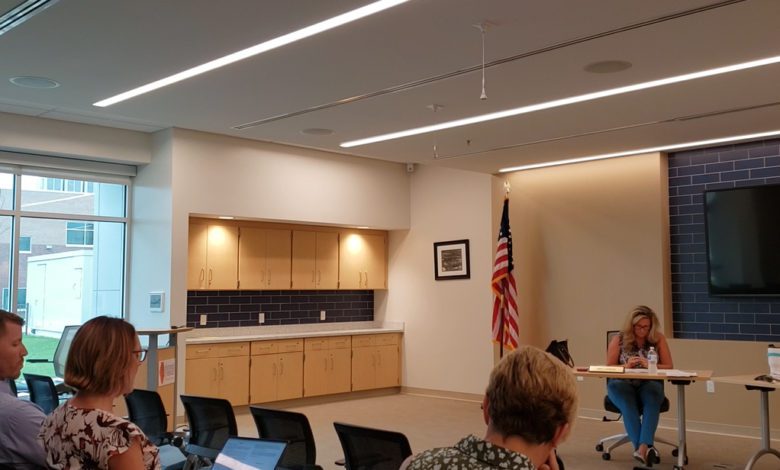Mahomet-Seymour continues to look at updated movie policy

BY DANI TIETZ
dani@mahometnews.com
The Mahomet-Seymour Education Association has shown concern with a movie policy that was brought to the Mahomet-Seymour Policy Committee on Aug. 12, 2019 by Director of Instruction Nicole Rummel.
Rummel’s proposed change to Policy 6:210 read: “Teachers are encouraged to use age-appropriate supplemental material only when it will enhance, or otherwise illustrate, the subjects being taught. Elementary teachers shall show only G-rated and PG-rated movies. PG-rated movies require prior Principal approval and parent notification. Junior high teachers shall only show G-rated, PG-rated and PG-13-rated movies. All PG-13-rated movies require prior Principal approval and parent notification. High school teachers shall require Principal and Superintendent (or designee) approval for R-rated movies. Parent notification is required for all R-rated movies. No movie rated NC-17 (no one 17 and under admitted) shall be shown under any circumstances. These restrictions apply to television programs and other media with equivalent ratings. The Superintendent or designee shall give parents/guardians an opportunity to request that their child not participate in a class showing a movie, television program, or other media.”
Rummel said that staff feedback prompted the discussion. The prior policy only included guidance on R and NC-17-rated movies.
Rummel said that she has fielded questions that have “come up from staff in this past year,” so she thought the policy needed additional language to account for the requested guidance on “movies or sections of movies that would be shown.”
Aside from adding guidelines for what can be shown at each grade-level, Rummel said it was also important to give parent notification so that a parent could voice their concern if they had one or opt their child out of the movie.
Policy Committee member Meghan Hennesy asked it the policy was targeting curriculum-based movies or fun-day movies.
She suggested if they are curriculum-based movies, the parent-approval process could take place at the beginning of the year to ease the burden on teachers and parents.
Hennesy also said that “not all PG-13 movies are created the same” so she asked if a timeframe for parent notification could be established.
She wondered if the district could set up a library of parent pre-approved movies that teachers could choose from for a fun-day. She said if the district could establish something where parents could get a list at the beginning of the year with what was in the library, then they could show from that selection throughout the year.
Hennesy also said that as things come up, it might be wise to place a timeline for parent notification within the policy so that parents feel like they have enough time to review and respond with permission.
She threw out 48 hours notice.
“Movies are something that parents have a wide range of feelings on,” she said. “I’m just trying to make sure that we give people enough breadth of time to be able to (respond). And then how do we set that up so that we can get this upfront at the beginning of the year so that there are no surprises.”
Hennesy also wondered how the policy might change if a teacher was to show an R-rated movie in high school as the law requires guardian approval for a minor to see an R-rated movie.
Rummel said that there may be some movies that could be listed at the beginning of the year, especially if they are part of a course. She also said that teachers might show a movie as part of a class incentive and those movies were more likely to change from year-to-year.
She agreed that a timeline notification would be fair; she said most teachers might send that notification a week before the movie shows.
Policy committee member Lori Larson said that she feels like the school district does this and that the policy was just adding language to protect itself.
Larson said that she was notified when her children were part of the fifth-grade body changes discussion and in high school when they were in sex education.
Superintendent Lindsey Hall said that the policy that Rummel presented probably included the amount of language that it needed, but what Hennesy was talking about might be better suited for the administrator procedures manual.
Hall said that a form letter might also be included in the manual.
Hennesy said it might even be worthwhile to put it on the website. She also suggested that information about how the parent should notify the teacher might need to be developed.
“I just like to set expectations and process because I think it makes the lives of teachers a little bit easier, I think it makes the lives of parents easier when everybody understands what to expect,” Hennesy said.
She said that she was fine with the timetable and process not being included in the policy, but wanted to make sure that the conversation and process continued to be developed.
Hall agreed.
When the full board discussed the policy on Aug. 19, 2019, the board consensus was to ask the administration to come back with a recommendation of a process to notify parents about movies planned to be shown once the policy has been approved by the Board.
Board members Merle Giles and Jeremy Henrichs wanted to see clarification of notification and permission, leaning more towards permission.
On Sept. 30, 2019, the Policy Committee re-looked at the policy.
Hall asked if the committee was looking for permission at all levels of movies. She suggested permission for junior high and above and encouraged tacit permission if a parent hadn’t opposed.
Hennesy brought the 48-hour suggestion from previous discussions back up, and Hall said that it may be best to include language that states a minimum of 48-hours notification.
“I think what we might see happen, and what might already happen, is at the beginning of the semester, saying here are some movies that are going to be shown,” Hall said. “Or it could be a week in advance.
“Then I think (a reminder), ‘Hey, (movie day) is coming up.’”
Hall brought to the table an idea that the district could create a table, listing out the movie rating system and what would happen.
Larson and Hennesy agreed on all fronts and suggestions to update the movie policy. Larson motioned that the policy be brought to the board for vote. Hennesy agreed.
By the time the policy came before the full board on Oct. 21, 2019, Hall recommended that the board not approve policy 6:210.
It was modified to read (see full text in packet below): “Teachers are encouraged to use age-appropriate supplemental material only when it will enhance, or otherwise illustrate, the subjects being taught. Elementary teachers shall show only G-rated and PG-rated movies. PG-rated movies require prior Principal approval and parent notification. Junior high teachers shall only show G-rated, PG-rated and PG-13-rated movies. All PG-13-rated movies require prior Principal approval and parent permission. High school teachers shall require Principal and Superintendent (or designee) approval for R-rated movies. Parent permission is required for all R-rated movies. No movie rated NC-17 (no one 17 and under admitted) shall be shown under any circumstances. These restrictions apply to television programs and other media with equivalent ratings. Teachers shall give parents/guardians a minimum of 48-hours notification with a follow-up reminder before showing any movie to give parents/guardians an opportunity to request that their child not participate in a class showing a movie, television program, or other media.”
“I did get some feedback from some folks,” Hall said.
Hall still believed that Rummel’s initial proposal, the language surrounding types of movies and notifications should be included. She no longer felt comfortable with the timetable of notification.
Hall clarified that the Policy Committee added the time frame.
Hennesy said that she had teachers contact her about the policy, asking about if they are required to notify parents when they show CNN or a clip.
She clarified that the original policy required notification for rated motion pictures in their entirety, not clips that teachers might show.
“This language was intended to be either movies that are not part of the curriculum or if you are going to show an entire movie. For example, when you read The Outsiders, if you then want to show the movie to the class, and you were going to show it in its entirety, you would give the parent notification that you were going to do that because there’s a rating that goes along with that and parents should have the ability to decide if they want their kids to see those ratings.”
Larson said she heard from teachers that they were already practicing this within their classrooms.
“I said, well, you’ve obviously not done it one time because it came up,” Larson said.
Larson backed away from her policy committee recommendation to approve the policy and said that it’s a dialogue that teachers need to have before the board approves it.
“Many people saw it as a criticism of something they were doing wrong, which they thought they were completely doing right,” she said.
Hennesy said that a policy is a contract between the school district and the parents that the district should make a good-faith effort to follow.
She said it was a community effort to raise the kids.
Hennesy said that unless there are way more movies than she imagines being shown in the classroom, she isn’t sure how the policy is burdensome.
Giles said that he’d like to see data on how many movies are being shown throughout the district. He also said that he’d like to hear back from parents, also.
Board member Ken Keefe said that the language of the policy was confusing; at one point it references all forms of educational material.
Hall said the confusing part of the policy, which Rummel revised, was “a movie, television program, or other media.”
Hall said that the district needs a policy like this, but more clarity is needed and “the in-the-weeds-procedures need to be in the administrative procedures and not in policy.”
Hennesy said that parents do not have access to the administrative procedures manual, and would not be privy to those details if it is not in the policy.
“Policy is not just something that you roll out to staff, it is also a contract that you have with students and parents,” Hennesy said. “We can’t limit this so much that half the people in the contract don’t know what the rules are.”
Giles said that the board does not even know the behavior inside the schools in regards to movies. He asked that teachers provide information on how they notify parents.
Board member Colleen Schultz said as a parent she’s never had a problem with being notified of a movie her children have seen, but she just wants to ensure that parents in the future have that same courtesy.
The board agreed that Hall and Rummel should work out the language and run a draft past the policy committee again.





